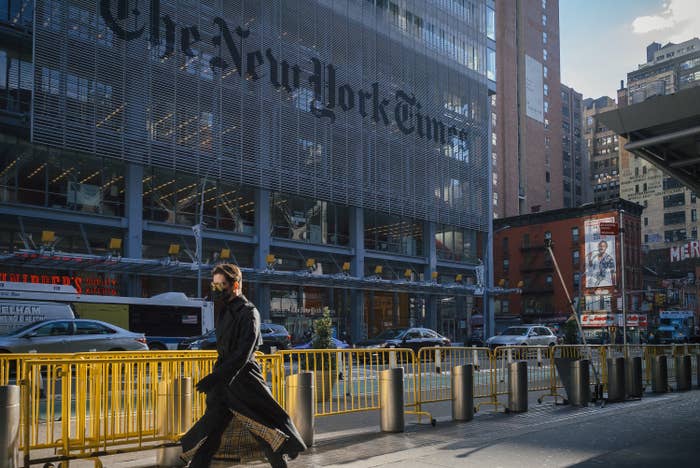
WASHINGTON — A judge in New York on Thursday took the rare step of temporarily blocking the New York Times from publishing certain documents about the right-wing activist group Project Veritas.
The Times planned to immediately challenge the order from Westchester Supreme Court Justice Charles Wood, arguing that it was “prior restraint” that violated decades of First Amendment protections for the press, according to a statement from executive editor Dean Baquet.
"This ruling is unconstitutional and sets a dangerous precedent. When a court silences journalism, it fails its citizens and undermines their right to know. The Supreme Court made that clear in the Pentagon Papers case, a landmark ruling against prior restraint blocking the publication of newsworthy journalism. That principle clearly applies here. We are seeking an immediate review of this decision,” Baquet said.
Thursday’s order was styled as a temporary prohibition in advance of a potentially even more explosive First Amendment showdown: Wood halted the Times from publishing the documents at issue while he considers not only a longer-term prohibition, but also whether to order the Times to take down information from a Nov. 11 article.
Project Veritas petitioned Wood to step in after the Times published an article on Nov. 11 based on a set of memos the news outlet obtained that were written by a lawyer for Project Veritas, Benjamin Barr. A year ago, Project Veritas had sued the Times for defamation over a separate article about the group’s work. Barr is representing Project Veritas in that litigation, which remains pending, and the group accused the Times of “improperly” trying to get privileged attorney–client communications and then publishing them to “harm and embarrass a litigation adversary.”
Wood’s order bars the Times from publishing “any of Project Veritas’ privileged materials” until he rules; he scheduled a hearing for Nov. 23.
In a brief initial response to Project Veritas’s request, lawyers for the Times wrote that the group hadn’t presented any evidence that the reporters involved in the story “improperly” obtained the memos, and asked the judge to give the outlet a chance to fully respond before imposing “such a draconian and disfavored restriction.”
Project Veritas’s lead attorney Libby Locke disputed in an email to BuzzFeed News that Thursday’s order was an act of prior restraint — “Nonsense,” she wrote — since the Times previously had published a link to the memos. According to an affidavit that Locke filed in court, the link was no longer active.
“Here, The Times already published Veritas’ attorney-client privileged communications, and the interim order and more permanent relief sought are narrowly tailored to that misconduct,” Locke wrote in an email to BuzzFeed News.
A spokesperson for the Times confirmed in an email to BuzzFeed News that before the story published, “a selection of the documents, which we did not intend to publish, was inadvertently published due to a technical issue and then unpublished.”
Bruce Brown, executive director of the Reporters Committee for Freedom of the Press, said in a statement that this was the first prior restraint order entered against the Times since the Pentagon Papers case, and called it "an outrageous affront to the First Amendment."
"Prior restraints — which are orders not to publish — are among the most serious threats to press freedom. The trial court should have never entered this order. If it doesn’t immediately vacate the prior restraint, an appellate court must step in and do so," Brown said.

